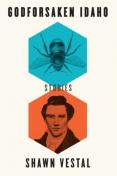BKMT READING GUIDES
Godforsaken Idaho
by Shawn Vestal
Paperback : 224 pages
2 clubs reading this now
0 members have read this book
Winner of the 2014 PEN/Robert W. Bingham Prize for Debut Fiction
Shortlisted for the William Saroyan International Prize for Writing
Named “Outstanding 2013 Collection” by The Story Prize
Pushcart Prize Winner
In this stunning debut, Shawn Vestal transports us to the afterlife, the ...
Introduction
Winner of the 2014 PEN/Robert W. Bingham Prize for Debut Fiction
Shortlisted for the William Saroyan International Prize for Writing
Named “Outstanding 2013 Collection” by The Story Prize
Pushcart Prize Winner
In this stunning debut, Shawn Vestal transports us to the afterlife, the rugged Northwest, and the early days of Mormonism. From “The First Several Hundred Years Following My Death,” an absurd, profound vision of a hellish heaven, to "Winter Elders," in which missionaries calmly and relentlessly pursue a man who has left the fold, these nine stories illuminate the articles of faith that make us human.
The concluding triptych tackles the legends and legacy of Mormonism head-on, culminating in "Diviner," a seriocomic portrait of the young Joseph Smith, back when he was not yet the founder of a religion but a man hired to find buried treasure. Godforsaken Idaho is an indelible collection by the writer you need to read next.
Editorial Review
A Q&A with Shawn Vestal and Jess Walter
Shawn Vestal has worked for many years as a journalist and editor at The Spokesman-Review in Spokane. His stories have appeared in McSweeney's and Tin House, among many other publications, and his new collection is Godforsaken Idaho.Jess Walter is the author of six novels, one book of short fiction, and a new story collection, We Live in Water. His most recent novel, Beautiful Ruins, was named the best book of 2012 by Esquire and NPR’s Fresh Air.
JW: Let’s start with the title, Godforsaken Idaho. You grew up in Southern Idaho. How much does the setting play a part in these stories, and in you as a writer?
SV: Idaho is so deeply a part of me that I probably don’t even recognize the ways it emerges in my writing. I never set out to write about the state in any direct way--but on some level, I am probably always writing about Idaho, or my childhood and family and everything else that is tied up in Idaho for me. It’s a place I love and a place that drives me crazy and, most of all, a place that I know.
JW: “The First Several Hundred Years Following My Death” is such a funny, original, matter-of-fact depiction of the banality of afterlife. How did that story come about?
SV: I wrote the first lines with no idea of what might lie behind them: “The food is excellent. The lines are never long. There’s nothing to do with your hands. These are the first things I told my son. Then we don’t talk again for something like 200 years.” I think the voice and the story’s conceit were built into those lines, and I spent a lot of time extracting the story from them.
JW: “About as Fast as This Car Will Go” has flashes of autobiography. What do you do when you a story approaches the details of your own life?
SV: I usually recognize it only after the fact, strange as that may seem given how obvious some of the connections are. I never set out to write about my life, even indirectly. But I always find, through the roundabout operation of the imagination, that I’ve returned to the same few preoccupations: absent fathers, criminal fathers, regretful fathers--they’re everywhere in my fiction. Not much mystery there: My own father went to jail, and then prison, when I was a boy. Yet nothing that happens in “About as Fast” happened to me. My father committed different crimes, and my family situation is much, much different, and I--crucially, I’d like to think--did not follow him into a life of crime. So far.
JW: These stories often deal with the mythology and hypocrisy of religion, even its mystery. How did your lapsed Mormon faith figure in these stories?
SV: More in the lapse than the faith, probably. Like a lot of people who have left a religion, probably, I was focused for a long time on the hypocrisy of the faithful and the failures of religion. But that is such a standard, clichéd pose--as if only the faithful are hypocritical or ignorant or deluded or weak. I wanted to write about doubters, denouncers, heretics. Though I have left the church, Mormonism is my heritage, and using the materials of Mormonism’s stories to write new ones--even stories that might seem heretical to some--became a way of keeping possession of this heritage.
Discussion Questions
No discussion questions at this time.Book Club Recommendations
Recommended to book clubs by 0 of 0 members.
Book Club HQ to over 88,000+ book clubs and ready to welcome yours.
Get free weekly updates on top club picks, book giveaways, author events and more








